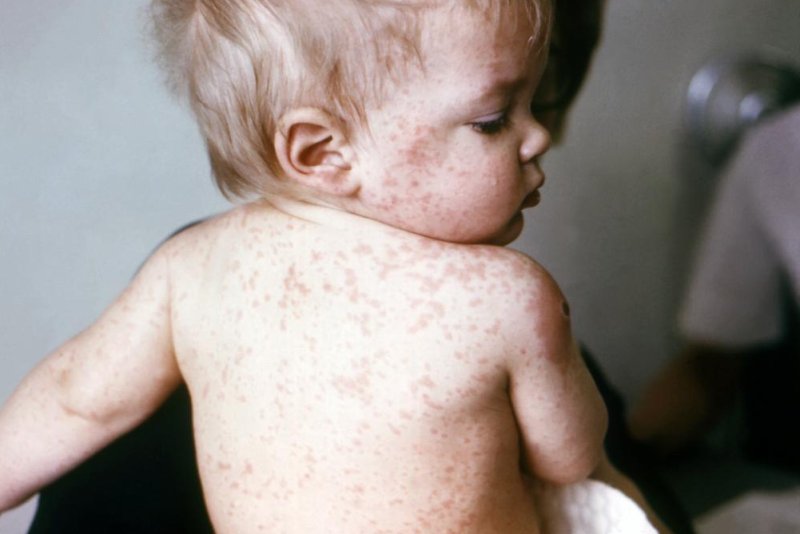A child with the measles. (CDC)
ATLANTA, May 29 (UPI) -- Since January, 228 cases of measles were reported -- a 20-year high for the first five months of the year.
A report published in the Centers for Disease Control and Prevention's Morbidity and Mortality Weekly Report said nearly all of the measles cases this year were associated with unvaccinated people who traveled to countries where measles is common, getting infected and returning home to infect others.
Dr. Anne Schuchat, assistant surgeon general and director of CDC's National Center for Immunizations and Respiratory Diseases, said 90 percent of all U.S. measles cases were in people who were not vaccinated or whose vaccination status was unknown.
Of the 288 cases, 97 percent were associated with importations -- people getting infected in another country and bringing the illness with them back to the United States -- from at least 18 countries. Of the cases this year, more than 1 in 7 resulted in hospitalization.
"The current increase in measles cases is being driven by unvaccinated people, primarily U.S. residents, who got measles in other countries, brought the virus back to the United States and spread to others in communities where many people are not vaccinated," Schuchat said in a statement.
"Many of the clusters in the United States began following travel to the Philippines where a large outbreak has been occurring since October 2013."
As the summer travel season begins, the CDC advises two doses of the measles, mumps, and rubella vaccine for everyone beginning at age 12 months. For babies traveling internationally, the CDC recommends those older than 6 months should receive the MMR vaccine prior to departure.
In addition, healthcare providers need to be alert to the possibility of measles and be familiar with the symptoms. Patients with fever and rash along with cough, runny nose, or pink eye should be evaluated for measles -- especially, if the patient is unvaccinated and recently traveled internationally or was exposed to someone with measles or who recently traveled, Schuchat said.
Physicians who suspect measles should immediately isolate the patient to prevent the disease from spreading, report the case to the local health department and collect specimens for blood and viral testing.
"Many U.S. healthcare providers have never seen or treated a patient with measles because of the nation's robust vaccination efforts and our rapid response to outbreaks," Schuchat said.
Measles was declared eliminated from the United States in 2000 -- meaning there was no longer continuous measles transmission for more than 12 months, the CDC said.















